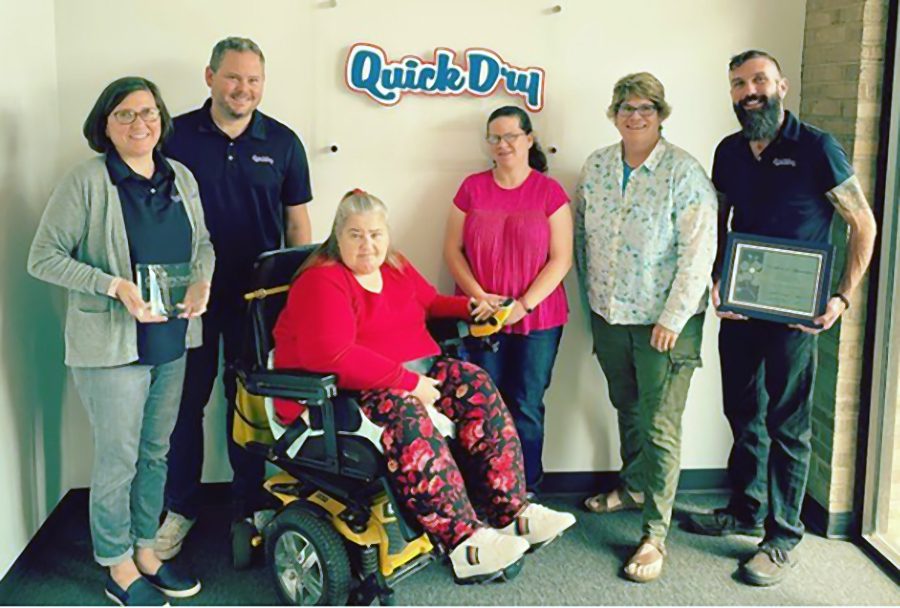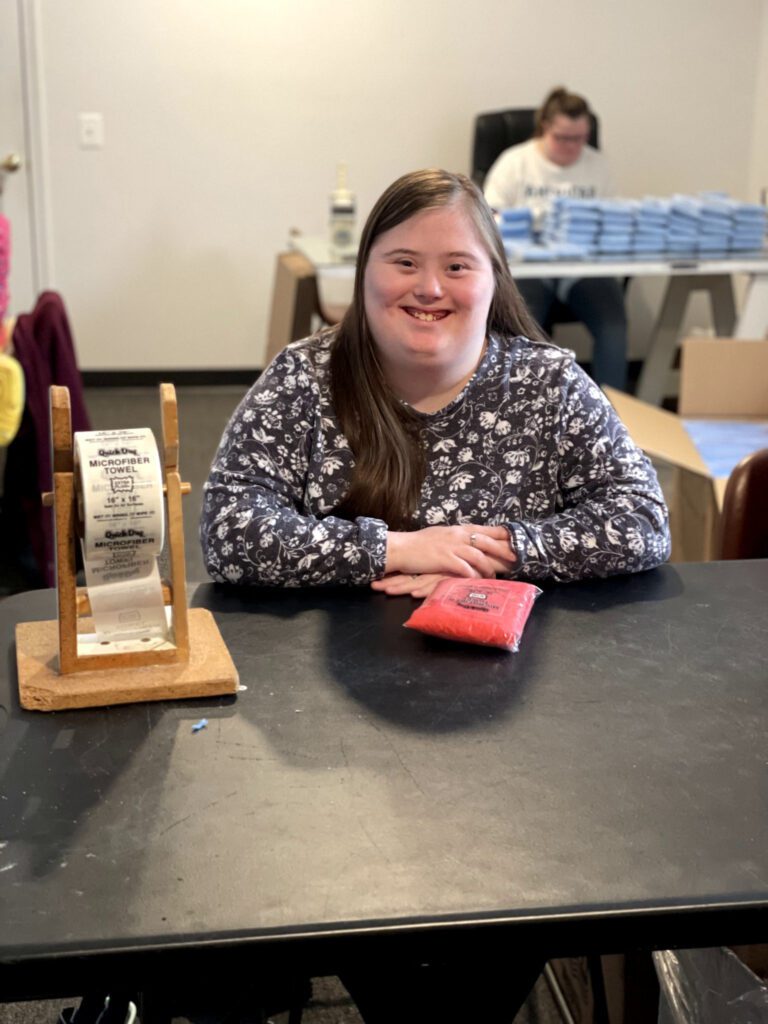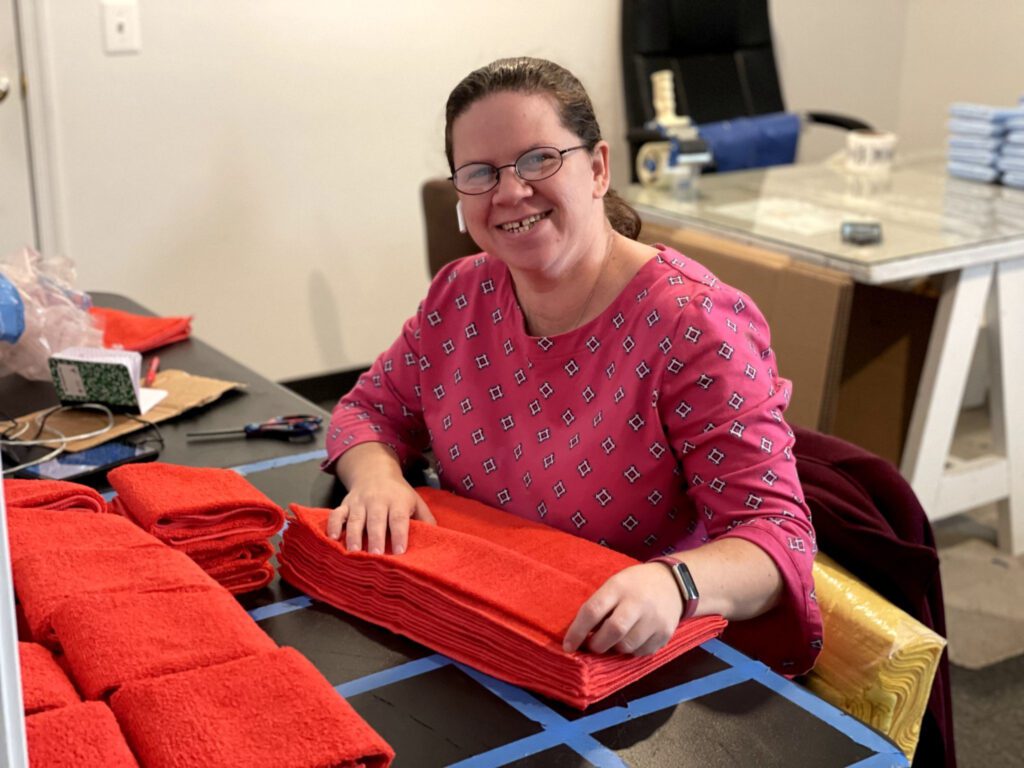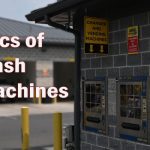Developing and retaining a work force is becoming increasingly more difficult in modern times. At the same time, we are developing methods to make work tasks more efficient and effective. We still need a human force behind these processes though. For some companies, this has led them to look into alternative sources for employees, often with great success.
Q.B. Enterprises, who you would recognize as the maker of the highly popular Quick Dry Vending Towels and the Quick Dry Glass Cleaner, has worked to develop their business and production methods to create new opportunities for an oft-ignored group of potential workers. Recently, Q.B. Enterprises received a Small Business Champion of Disability award from the Virginia Department of Aging and Rehabilitative Services (DARS) for their work with disabled teens and adults.
We got the chance to talk with the Q.B. team – Becky Kube, the wife of founder Roger; daughter Lindsay Wiles; and son-in-law and marketing manager Jonathan Wiles – about their efforts and the program they’ve developed, and how it can be a roadmap for others across the car wash industry to discover a new workforce!
A History of Working with the Disabled Community
Founded by the Kube family in 1982, Q.B. Enterprises grew from an idea that struck Roger Kube, using laundered surgical towels for drying and more in the car wash industry. A family business, growth required some novel thinking. The ideas and processes Roger had to that would set their product apart would need some solutions outside of the usual manufacturing processes.
Both Roger and Becky were involved in the medical field at the time, and involved with the hospitals in the region. Early on, the company was intertwined with the local community of adults with disabilities. The Kubes worked with a local workshop for adults with disabilities, Didlake, to provide those in the program with hands-on training. Covering three counties, the company employed up to 50 adults throughout the year, folding and packaging towels. They were the core team in the growth of the company.
However, in 2018, Didlake discontinued the program. Undaunted, the Q.B. team decided to develop a program on their own to continue providing these employment opportunities for the disabled community.
Building an In-House Program
Developing an internal program from the framework of Didlake’s program was no easy feat, but Lindsay was prepared to tackle it! For them, it’s not just a program – it’s personal for the Kube and Wiles families. The Wiles’ daughter Paloma was born with Down’s Syndrome, and they saw the potential for providing their daughter with a rewarding task while contributing to the family business.
Making sure that they could continue to provide that avenue to their daughter and members of her community was important, and required commitment by everyone. “It’s been a learning process,” says Lindsay. Jonathan agrees – “It’s a lot of dinner table discussions about how we’re going to meet the challenge.”
They developed tasks and processes that could be customized for teens and adults with disabilities. There are plenty of them in the manufacturing process – from how things are counted, to how workers know packaging is correct, to step by step processes on how towels are folded, to finding and attaching the appropriate sticker for packaging in the correct spot. Lindsay created processes and aids to help program members tackle these job needs.
Different Plans for a Diverse Workforce
With all that effort, the team was ready, but they also knew that one size wouldn’t fit all.
Q.B.’s program isn’t just for young adults with Down’s Syndrome. Lindsay and the team work with students and adults with various complex issues and disorders. These can include students with physical disabilities, mental disabilities, or both. “We’re not usually told what they’re facing. So sometimes someone comes in with a wheelchair, or they come in with a verbal issue, and we adapt to what they’re facing, adjust tasks to it.”
This means a hands-on approach for Lindsay and team, and realizing that adaptation will be a constant. Says Lindsay, “We had to do multiple time studies. You realize everyone has their strengths and weaknesses. Once you meet the person, you have to figure out where does this person excel, where are they struggling? You have to meet the person where they are when they come in, figure out what they do best, and adapt it for them.”
Don’t underestimate what people with disabilities can do
Lindsay Wiles
Ongoing Success and a Revolving Workforce
The team has seen the successes of the program over the years, and celebrates them! It’s not just the recognition they’ve received – it’s knowing that they have made an impact in the lives of the program members.
Unfortunately, these workers don’t always stay with them for too long – but it’s incredible to see why. For instance, their daughter recently moved on to the George Mason LIFE program, an innovative post-secondary program. At the end of the four years, the program gets the students into a position where they can transition into adulthood with limited assistance.
Jonathan feels that the in-house program helped Paloma step into the George Mason program. “It helped her understand she can do more than just go to school and come home, that she can have a purpose!” It’s not just Paloma that is a great example – they have had a number of teens and adults move on from their workplace to roles elsewhere, developing into adults with purpose.
They’ve also had workers whose families have moved out of the area. Still, those workers get to take with them a higher level of independence and capabilities than they may have had otherwise, helping them into their next stage of life and career.
See Past the Disabilities
Lindsay sees teens and adults with disabilities as being a great potential workforce for car washes and manufacturers alike. “The biggest piece of advice I can give is to not underestimate what people with disabilities can do. They’re eager and they’re capable. Sometimes it takes them a little bit longer to get it, but once they have it, they’ll be your best workers. They stick with it, they’re dedicated, and they have such a great disposition being able to contribute.” Becky points out that “Every product that you ever need in the car wash industry, for self-serve, tunnels, touch-free, there’s ways that disabled workers can help in the process of making any product!”
Jonathan noted that there are agencies locally and state-run pretty much everywhere that are actively trying to place people with disabilities into the job market. They don’t just assign workers, they help the individual business to fit out and adjust their facilities to make them more workable for those with disabilities. “They helped us to understand what devices the person may need to be more successful,” says Jonathan, “There’s all sorts of things we didn’t have the resources for, but the right channels helped us get.” Many of these agencies will also help to offset the costs of adjusting processes and facilities to work with the disabled community as well. This way, the manufacturer or car wash owner who decides to take on team members and work with them isn’t going it alone.
We’re thrilled that Q.B. Enterprises is finding a place for teens and adults with disabilities to obtain job training and become part of the work force. We encourage manufacturers and wash owners to reach out to their local agency and see how they can work with a great segment of the population that has so much more to give!











